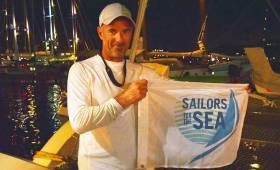Displaying items by tag: Ocean Racing
Making Ocean Racing Safer – For Sailors – And Whales
I have been thinking of whales this week and remembering when I first saw a big one very close-up, so at the start of my podcast you can hear the sound, recorded underwater in the Atlantic Ocean of a humpback whale communicating with other whales.
The stranding of hundreds of whales on the New Zealand coastline was harrowing in the television pictures which showed the helplessness of these magnificent creatures when out of their environment, stranded ashore and the enormous efforts of human beings to refloat them. Some of those efforts were successful, but unfortunately, many whales died…..
The moment when I first saw a whale close-up is one of the memories etched on my mind. I was on the bow of Ireland’s first entry in the Round the World Yacht race in the Atlantic in May of 1990 when it happened. Suddenly, a huge whale was alongside us, so close I felt I could touch it. NCB Ireland was 85 feet long and the whale seemed, to my eyes, to be just as big and very close to the boat. I was awed by this magnificent creature which had emerged from the ocean and seemed to be staring at me. Having paced NCB for a while it effortlessly moved away, so much more part of the ocean world than us humans aboard NCB. I felt breathless as it disappeared from sight.
British Zoologist, Mark Carwardine, described such an experience well in his ‘Last Chance to See’ series on BBC Radio 4: “To have a huge whale approach your boat and look you straight in the eye is without doubt one of the most extraordinary experiences on the planet.”
That memory came to mind when Ireland’s top ocean racer, Damian Foxall, wrote to me in his present role as Recreation Education Manager at the Canadian Wildlife Federation. As the number of ocean yacht races increases, he is running a campaign to help scientists better understand areas of the world’s oceans where marine mammals are at risk of being struck by boats. Increasingly during these races there have been reports of yachts striking unidentified objects. “Currently the database for marine mammal strikes is very sparse,” he says. “We want to assemble reports of boats striking them. If everyone co-operates it will help plan future racing safely.”
If you can help Damian’s campaign you can Email him to: [email protected] Listen to the podcast below
























































